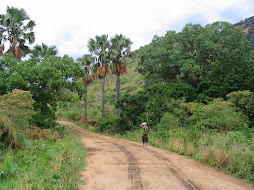





So I am in Nairobi now and what a good time to be here...not!
Kelly and I were in Loki, Kenya just yesterday, which is on the border of Sudan. We spent Christmas there, and a total of 9 days. It was very nice in Loki because we had our own house with 2 bedrooms and 2 bathrooms and a kitchen. We were able to cook and even bake! It was extra nice there because Loki has a restaurant called 748 that has wireless Internet, coffee, and ice cream! So, we went there a lot. On Christmas we were able to go there and skype home which was great. On Christmas Eve we went to another missionary's house and had dinner, and then came home and watched the ole classic "An Affair to Remember," and afterwards sung Christmas carols, ending with "Silent Night" in the candle light. We even made a make-shift tree out of some baskets and put our few presents around it. The presents we had were from two of the missionaries: a Turkish coin purse, and Chinese Green Tea. In the morning we made pancakes while listening to more Christmas carols. Then, that night we went out to 748.
So, yesterday, when we thought it was safe because elections were over and Loki was perfectly safe, we flew to Nairobi, just to find out that no stores were open because its too dangerous for the workers to leave their houses. Most of the workers live in the Kebira district, where all the looting and rioting is going on. For more information, please click on the link to the right for BBC NEWS.
So, yesterday nobody knew who was president yet, but it became evident that some fishy business was going on, because the votes just didn't add up correctly. Today, Kibaki was announced president by his appointed election commissioner (hmmm..sound fishy anyone?). And again, there is nothing open. Today we spent 600 Kenyan Shillings in Taxi service to go to the mall. There, we were able to go to the supermarket just before they closed and it was a MOB! It was like going to Wal-Mart on a Sunday or the night before a snow storm!
Then we went to a coffee shop that stayed open for about 2 hours before closing, and people there were getting all hyper about buying Baguettes b/c there was a scarcity of Baguettes. After waiting an hour for our plain coffee, we wandered up to the hair salon and got our hair cut and pedicures. Yes, pedicures-- but if you saw my feet in a before picture you would understand why it is a necessity, not a luxury! The lady who worked on me said "you brought sand from Sudan." I laughed really loudly in agreeance.
So, just so everyone knows, we are perfectly safe at the guest house in which we are staying. The pictures are compliments of BBC and not from my camera. Kelly and I have been staying FAR from downtown where all the uproar is going on. Today (which is now the 31st), we stayed on the guest house grounds, with the exception of a short walk. Fortunately for us, the guest house is quite large, including a courtyard and playground area. As grocery stores are being looted and people being killed from violent riots, Kelly and I spent our evening playing on a see-saw (teeter-totter). We are happy, but a little bored...but at least boredom never killed anyone. AIM has issued an email that all of us in Nairobi are to stay in our houses and lie low for awhile. So, our plans are changed and we are not leaving Nairobi until the 7th (my Mom's Birthday and Orthodox Christmas). Our free ride to Entebbe was canceled because they were advised not to travel. On the 7th, instead, we will fly out to Entebbe for our regional conference.
Please pray for a PEACEFUL resolution in Kenya. Thanks.















































































